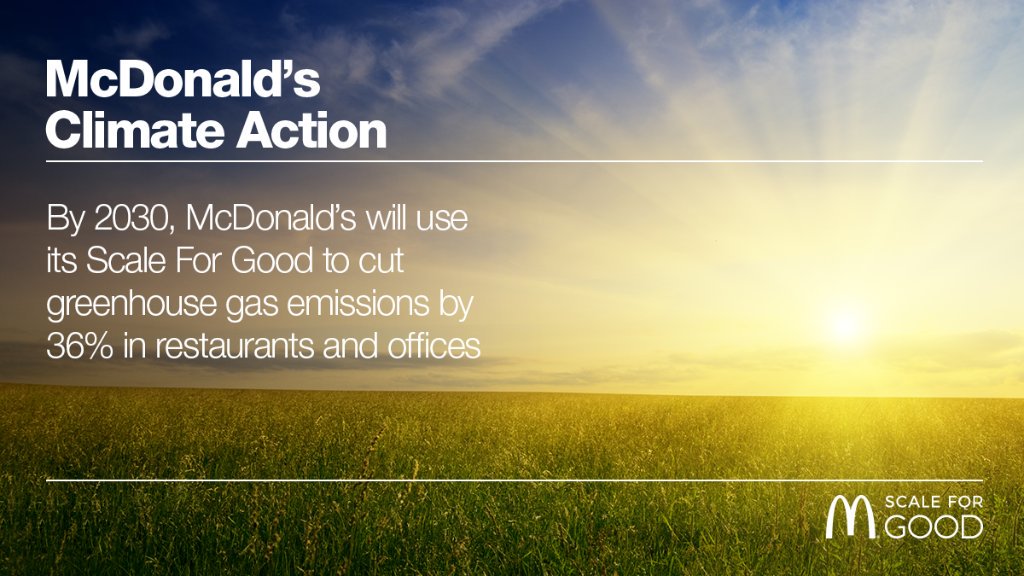|
CHICAGO -- McDonald's announced the signing of two long-term, large-scale virtual power purchase agreements (VPPAs), whereby McDonald's will buy renewable energy generated by Aviator Wind West, a wind power project located in Coke County, Texas and a solar project located in Texas. The combined 380MW in renewable energy expected to be generated from McDonald's contribution to these projects will help to prevent over 700,000 metric tons of carbon emissions each year, which is equivalent to planting more than 11 million trees or taking over 140,000 cars off the road for one year. Additionally, the energy generated by these U.S. projects will be equivalent to over 2,500 restaurants-worth of electricity.
Also read, Chipotle Joins Chicken Commitment In Europe and Canada to Enhance Animal Welfare Standards. In March 2018, McDonald's became the first restaurant company in the world to set a greenhouse gas (GHG) emissions target approved by the Science Based Targets initiative (SBTi). These two U.S. renewable energy projects will represent significant progress toward McDonald's Climate Action Target to reduce GHG emissions related to McDonald's restaurants and offices by 36% by 2030. Once online, the GHG emissions reductions from these two deals are expected to deliver 16% in progress toward our Climate Action Target or 6% in GHG emissions reductions from our 2015 baseline. "As we look at the most pressing social and environmental challenges facing the world today, McDonald's has a responsibility to take action, and our customers expect us to do what is right for the planet," said Francesca DeBiase, Chief Supply Chain and Sustainability Officer, McDonald's. "These U.S. wind and solar projects represent a significant step in our work to address climate change, building on years of renewable energy sourcing in many of our European markets. We want to keep this momentum going, and we're excited for what's next." Both of these projects will impact the local community by jointly generating over $200M in local tax revenue and helping to provide approximately 600 new short-term construction, operations, maintenance jobs, as well as 13 long-term jobs. "McDonald's significant investment in 380 MWs of renewable energy to cover a large chunk of the GHG emissions from the electricity purchased by their franchisees is groundbreaking," said Marty Spitzer, Senior Director, Climate and Renewable Energy, World Wildlife Fund. "Knowing their franchisees are typically small businesses that don't have the capacity or resources to buy renewable energy at the scale needed to tackle the climate challenge, McDonald's has taken a road untraveled. Other companies with thousands of franchisees need to take notice." "McDonald's worked tirelessly to align its organization, design a creative strategy that fits its unique franchised business model and build a strong foundation for future transactions," said Gary Farha, president and CEO of CustomerFirst Renewables. "With this initiative, McDonald's is taking an important step towards addressing its carbon footprint and is demonstrating leadership by inspiring others to act." McDonald's is committed to taking bold action on climate change and the environment. In addition to the restaurant and office GHG reduction target, McDonald's has also committed to seek a 31 percent reduction in emissions intensity (per metric ton of food and packaging) across our supply chain. Through its Scale for Good platform, the company is also working toward 2025 goals to make 100 percent of McDonald's guest packaging come from renewable, recycle or certified sources and to recycle guest packaging in 100 percent of McDonald's restaurants. SOURCE McDonald's Corporation
0 Comments
|
Advertisement
News & Updates
Stay informed with the latest news around foodservice, agriculture and other related food news. Advertisement Opportunities
|


 RSS Feed
RSS Feed


